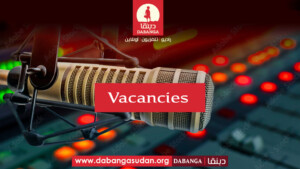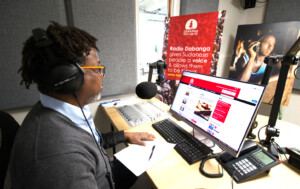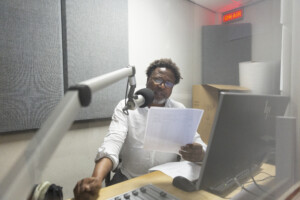Radio Dabanga: Censored in outer space
On February 18, the TV image from Dabanga suddenly went dark. Without prior notice, an Egyptian satellite company booted the station off its satellite. This was the most recent attempt by the Sudanese government to silence Radio Dabanga in its supression of free media in Sudan.

On February 18, the TV image from Dabanga suddenly went dark. Without prior notice, an Egyptian satellite company booted the station off its satellite. This was the most recent attempt by the Sudanese government to silence Radio Dabanga in its supression of free media in Sudan.
Outraged reactions to censorship
People in Sudan were outraged about the regime’s measure against Radio Dabanga. Faisal El Bagir of the network of Journalists for Human Rights (JAHR): “This measure illustrates that the regime does not tolerate independent opinions and voices, especially when it comes to the voices of those who would otherwise never be heard.” Opposition leaders from different regions also reacted strongly in the news: “Radio Dabanga is the lung for the Sudanese people to breathe credibility, objectivity and a purposeful message.” Others said: “This is a crime against millions, and a violation of international treaties on the freedom of expression.”
And: “The cooperation between the security forces of Sudan and Egypt in this matter is a desperate attempt to stifle that free and democratic voice.”
A deal with Egypt
There was, in fact, coordination between Sudan and Egypt. The Sudanese government of president Omar Al Bashir – who is accused by the International Criminal Court of having committed war crimes – is making every attempt to silence the only independent radio station in the country. The government requested the Egyptian government to help them achieve this.
The Egyptian company Nilesat promises reliable satellite television services on its website. It wants to be an “all-inclusive” platform for “all our families”. Yet, the satellite broadcaster has excluded Sudanese families because Al Bashir’s request was deemed more important. Even though approximately 1,000,000 people turn on the Dabanga satellite channel each day. The Sudanese regime’s long arm of censorship reaches into Egypt and even into outer space.
The press laws that Sudan has, do not outweigh the measures which the security service is allowed to take against critical journalists.
Incitement
This is not the first time Radio Dabanga has been censored. In 2015 the satellite channel was booted from the well-known Arab Satellite Communication Organization (Arabsat). Arabsat complied to an official complaint from Sudan’s Ministry of Information that resulted in the removal of the Dabanga Sudan channel. ‘Radio Dabanga is considered an enemy of the Sudanese government, it’s not about a few controversial news items but about the whole station,’ Arabsat stated at the time. This to the delight of Sudanese minister Bilal Osman of Culture and Information, who accused Radio Dabanga of ‘incitement’ and of ‘causing instability in Sudan’.

Confiscation and arrests
The muzzling of Dabanga, however, is not unique. A review of the recent media history in Sudan reveals a litany of censorship, confiscation, intimidation, and persecution by the regime. With the regular confiscation of newspapers right from the printing presses, Al Bashir’s regime tries to destroy media houses financially. In January this year, a wave of arrests took place among journalists who had dared to report on demonstrations in response to the sudden rise in bread and fuel prices. This violated the fundamental right to freedom of expression – while during the protests, riot police further violated the human rights of demonstrators by beating them and launching tear gas. As journalists were absent, the exact number and severity of violations has not been recorded. Some of them were detained for weeks in a row without their family knowing where they were held.
It is not surprising that Sudan is one of the world’s lowest-scoring countries on Freedom House’s World Press Freedom Index.
Structural suppression
Who is in control of the media? The Sudanese regime has handed the executive power to the National Intelligence and Security Service (NISS), which is notorious for its detentions without charges, interrogations, seizures of newspapers and torture in detention. The press laws that Sudan has, do not outweigh the measures which the security service is allowed to take against critical journalists. The regime itself has total control of content, budget and editorial views of the National Television and Radio Corporation, next to other owned radio and television outlets. Plurality in media is absent, and critical voices unthinkable. This restrictive media environment silences voices, hinders professional development and limits the creativity of journalists.
Opposition
But Sudanese citizens and organisations are not giving up. Civil society organisations, journalists, and others who have an interest in independent news as well as Radio Dabanga’s audience continue to denounce the Sudanese regime’s censorship. Fortunately, Radio Dabanga has since continued broadcasting its satellite channel on Eutelsat, in the hopes that this private European company will not be susceptible to the reach of the Sudanese regime and its censorship requests. And the 1,000,000 Dabanga TV viewers can permanently be provided with news from an independent and free Sudanese media house.
Right now, Radio Dabanga needs your help to stay on air and reach listeners with life-saving information. Support the radio station and share this story online, or sponsor shortwave airtime for Radio Dabanga on GoGetFunding. Help keep Radio Dabanga on air!












 and then
and then